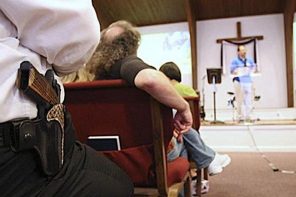While it is nice that President Obama will show up in Copenhagen for a feel-good moment at the end of the climate change talks (and not simply as a sidebar to picking up his Nobel in Oslo), we should bear in mind that, as a practical matter, what he’s bringing to Copenhagen is a lump of coal.
I say this because, in order to save face, his administration simply made up a number for a gradual reduction in US-generated CO2 emissions. But the president is going to Denmark with no firm Congressionally-endorsed target; with no US policy for action on climate change. In addition, the administration’s made-up number is embarrassingly modest; far more modest than the radical reduction timetable that climate-change science and the “decent opinion of mankind” (the old Jeffersonian standard) both now call for.
None of this, I want to stress, is the president’s fault. The reality and reputation of the United States as an energy hog goes back centuries. Seventeenth-century European colonists simply could not get over the abundance of what they saw on these shores from their little boats: unbelievably tall forests, which they promptly began to strip and burn. Rich coal seams under Eastern hills later ignited the steam-power revolution here, followed by a flood of black gold after Edwin Drake’s 1859 oil strike in Pennsylvania. Things got totally out of control when small-scale (what we today might call “sustainable”) farming gave way to petroleum-powered industrial agriculture, turning a practice that enriches the earth when done properly into a nightmarish extractive industry all by itself.
Dominion-Lite
Faced with seemingly inexhaustible resources, Wendell Berry observed, Americans acquired a “cheap-energy mind” that remains very much in effect and in force despite any lip service we pay to conservation and greening the planet. Of course bad religion plays a major role in this inasmuch as, historically, a majority of American Christians probably bought into the idea that God gives humans “dominion” over the created order (Gen. 1:28), inviting us to “fill the earth and subdue it.”
The later Christian idea of human stewardship of the earth is little better—“dominion-lite” is what I call it. In stewardship theology, we are still in charge but we need to make sure we don’t totally trash things up immediately. It’s still okay to cut down really ancient trees, for example, as long as we make sure to leave some new pine seedlings among the massive dead stumps.
Both the “dominion” and the responsible stewardship views reflect not only an unexamined anthropocentrism but also a fateful and fundamental assumption that what happens here on Planet Earth doesn’t matter all that much. And that is because this little planet, pretty as it is, is not our ultimate Home. As the wheezy old gospel tune puts it, “The angels beckon me, from Heaven’s open door, ’cause I can’t feel at home in this world, any more.”
The Bible assured Americans that God created humans “a little lower than the angels,” with European-American humans even more favored than others because (c’mon, look around!) we landed on all this wealth. What eventually happens to energy-rich people—people whose lifestyles are powered, literally, by the earth’s past organic life in the form of petroleum—is that such people grow addicted to power in unlimited applications. There is no question that Americans’ fabled restlessness, the lack of stability in our lives, is deeply connected to the capacity of internal combustion engines to propel a “cabin” on four wheels along the pavement. A case can even be made that all of our other addictions are colored and qualified, in certain ways, by an underlying addiction to oil.
Copenhoggin’
So if cheap energy and a cheap-energy mind got us into this mess, how will we find our way out?
The only way out is ethical, and at every level of what it means to live ethically. We might start at the top, with our president’s errand in Denmark. He arrives there with the embarrassment of unearned riches (one might even say the stolen riches) that Americans enjoy. He also arrives with a Nobel Peace Prize in his pocket, and he surely knows how much the future peace of the world hinges on a more just and much more restrained use of the earth’s resources.
There would no doubt be howls of protest from the Energy Hog Lobby back home, but the president could do the ethical thing in Copenhagen: he could announce that the United States will not only put itself on an aggressive energy diet but will also lead the developed world in making the enormous investments required (a) to compensate the poorest and most vulnerable countries for the emergency needs they face right now on account of climate change, and (b) to enable poor countries to leapfrog their way to a clean energy future.
This scenario is extremely unlikely, of course, but it is not unimaginable and it’s a good thing to imagine it. In relation to domestic public policy, the ethical path is even clearer and even more achievable. We need to build up a powerful public voice to say that industry-sponsored “cap and trade” approaches to curbing emissions are not only flawed but fraudulent—that the only way to make the turn away from overdependence on fossil fuels is mandated emission reductions imposed sector by sector, along with a heavy carbon tax without which we’re not going to make the turn at all. This is how grownups would deal with the real and present danger posed by cheap energy addiction. And at least some grownups need to start saying so.
Surviving, or Thriving?
Then there is the personal ethical challenge of living more lightly on the earth. Here, alert religious leaders could be helping a lot more, because they could help lift the blanket of fear from the necessary Great Turning that we need to be about. Far too many people view burning less energy and reducing their carbon footprints as a sacrifice. Wise faith leaders know that the opposite is true: that gaining more stability (in the original sense of stability: non-motion) will become a form of blessing. They know that paying closer attention to the world—by walking, not riding, for example, or perhaps by planting and tending a backyard garden—could open people’s spirits to greater reverence and humility and joy.
We can imagine this return to a firmer grounding on the earth as a kind of spiritual homecoming, as a much-needed and long-delayed healing of the deep wound we Americans gave ourselves when we plunged into our nomadic hypermobility. It is true that we won’t really step up to the climate change challenge without learning to redirect our desires, but we also know that redirecting our desires toward what is more beautiful and more nourishing than mindless consumerism is a very good thing.
Artists and visionaries have always known how to strip away what is inessential and distracting in order to see and celebrate what is lovely and true. Now the rest of us are about to take the same trip. And even though we will be making it more from necessity than choice, we should nevertheless expect to enjoy it deeply—to enjoy it in our bones, so to speak. The hair-shirt climate change scolds tell us that radically changing our energy use is all about surviving on a planet that already carries more than four times the human population than it carried in 1900. And yes, this radical change is about human survival. But our deepest religious sensibility knows that it is also about important spiritual thriving.




